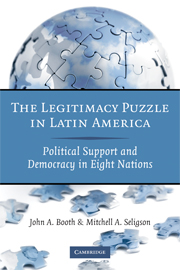Book contents
- Frontmatter
- Contents
- List of Figures
- List of Tables
- Preface
- 1 The Legitimacy Puzzles
- 2 The Structure of Legitimacy
- 3 Countries in the Study
- 4 The Sources of Political Legitimacy
- 5 Legitimacy and Political Participation
- 6 Legitimacy and Negative Political Capital
- 7 Legitimacy and Democratic Values
- 8 The Sky Is Not Falling: The Puzzle Solved
- Appendix A Supporting Data and Analyses for Chapters 1–5
- Appendix B Variables Used in the Analyses
- Appendix C System-level Performance Measures
- Appendix D Nonsampling Errors, Sampling Errors, and Design Effects for the Eight-Nation Survey
- Appendix E Method of Constructing the Legitimacy Factor Scores
- References
- About the Authors
- Index
1 - The Legitimacy Puzzles
Published online by Cambridge University Press: 05 June 2012
- Frontmatter
- Contents
- List of Figures
- List of Tables
- Preface
- 1 The Legitimacy Puzzles
- 2 The Structure of Legitimacy
- 3 Countries in the Study
- 4 The Sources of Political Legitimacy
- 5 Legitimacy and Political Participation
- 6 Legitimacy and Negative Political Capital
- 7 Legitimacy and Democratic Values
- 8 The Sky Is Not Falling: The Puzzle Solved
- Appendix A Supporting Data and Analyses for Chapters 1–5
- Appendix B Variables Used in the Analyses
- Appendix C System-level Performance Measures
- Appendix D Nonsampling Errors, Sampling Errors, and Design Effects for the Eight-Nation Survey
- Appendix E Method of Constructing the Legitimacy Factor Scores
- References
- About the Authors
- Index
Summary
Political legitimacy, for decades a bedrock concept in political science and appropriated by journalists and diplomats as part of their discourse on nation-states, is in trouble. Many books and articles have empirically demonstrated a protracted decline in political legitimacy and a rising disaffection among citizens of advanced industrial democracies. Yet the dire consequences of legitimacy's decline, predicted by the seminal works in the field, have not occurred. Wondering why those anticipated crises have not materialized has led us to reexamine our understanding of legitimacy theory and to test it with an unusually rich multi-country database.
Modern legitimacy theory originated with Max Weber's three-fold typology from Politics as a Vocation, a lecture delivered in 1919 (Weber 1965). He distinguished between “charismatic,” “traditional,” and “rational-legal” forms of legitimation of the state, arguing that the first two are unstable forms that eventually evolve into the rational-legal form dominated by a state bureaucracy. Weber, however, was not focused on the democratic state, and it was not until the 1960s that contemporary legitimacy theory began to emerge. Seymour Martin Lipset's classic work Political Man (1961) reviewed the long-term, historical process by which regimes overcome crises and evolve into stable political systems whose right to rule is widely accepted. David Easton then elaborated extensively on the concept of political legitimacy (Easton 1965a; Easton 1975), suggesting various subcategories of legitimacy.
- Type
- Chapter
- Information
- The Legitimacy Puzzle in Latin AmericaPolitical Support and Democracy in Eight Nations, pp. 1 - 37Publisher: Cambridge University PressPrint publication year: 2009



